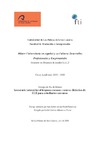Please use this identifier to cite or link to this item:
https://accedacris.ulpgc.es/jspui/handle/10553/74789
| Title: | Inventario intercultural hispano-coreano: recurso didáctico de ELE para estudiantes coreanos | Authors: | Von Der Fecht Fernández, Sara Isabel | Director: | Alfonzo De Tovar, Isabel Cristina | UNESCO Clasification: | 570111 Enseñanza de lenguas | Keywords: | Inventario intercultural ELE Corea del Sur Hallyu Intercultural inventory, , ,, et al |
Issue Date: | 2020 | Abstract: | La presencia y la difusión del español en Corea del Sur han ido aumentando progresivamente desde la segunda mitad del siglo XX. Este crecimiento se ha acelerado en las últimas décadas, situando al español entre los idiomas extranjeros más estudiados en este país. Sin embargo, siguen siendo escasas las investigaciones relacionadas con la enseñanza de ELE en este contexto. En este sentido, realizaremos una propuesta innovadora que toma como punto de partida el acercamiento al público hispanohablante por parte de la industria del entretenimiento surcoreana mediante la inclusión de referentes culturales hispanos
en sus productos. Esta investigación intenta analizar estos referentes como un punto de encuentro entre ambas culturas y crear con ellos un recurso didáctico intercultural para alumnos surcoreanos en el aula de ELE. Para ello, se presenta un marco teórico que recoge los antecedentes del español en Corea, seguido de una descripción de la metodología que se utiliza habitualmente en la enseñanza de la cultura en este país. También exploramos otros aspectos necesarios para la comprensión de este trabajo, como el concepto de interculturalidad y su situación en Corea del Sur o el auge de la ola coreana. Posteriormente, se diseña un inventario de recursos interculturales para, finalmente, aplicarlo en una propuesta didáctica que fomente la competencia intercultural. De esta manera, esta investigación intenta contribuir con la consolidación de la enseñanza de ELE en las aulas surcoreanas mediante el diseño de una herramienta intercultural para docentes de ELE. The second half of the 20th century has witnessed the progressive increasement of the presence and diffusion of the Spanish language in South Korea. Due to this expansion, which has been especially noticeable during the last few decades, Spanish has earned a place among the most studied foreign languages in this country. Despite this, the amount of research on teaching Spanish as a foreign language in this context is still scant. Having this into account, we will present an innovative academic proposal on this topic. In order to do that, we take as our starting point the fact that many Hispanic cultural referents have been being included in products from the South Korean entertainment industry in an attempt of approaching the Spanish-speaking audiences. The intention and objective of this work is analysing those referents so as to use them as a teaching resource in the Spanish classroom with South Korean students. For this purpose, we start with a theoretical framework that includes the history of Spanish in Korea and a description of the culture-teaching methodology most commonly used in this country. We will also introduce other topics that are necessary to have a deeper understanding on this paper, like the idea of interculturalism and its current situation in South Korea or the boom of the Korean wave. After that, we design an intercultural inventory and use it for the creation of activities aimed to develop the students’ intercultural competence. Through this intercultural tool for Spanish teachers, this work aspires to contribute to the consolidation of the Spanish teaching field in South Korea. |
Department: | Departamento de Filología Hispánica Clásica Y De Estudios Árabes Y Orientales | Faculty: | Facultad de Traducción e Interpretación | Degree: | Máster Universitario en Español y su Cultura: Desarrollos Profesionales y Empresariales | URI: | https://accedacris.ulpgc.es/handle/10553/74789 |
| Appears in Collections: | Trabajo final de máster |
En el caso de que no encuentre el documento puede ser debido a que el centro o las/os autoras/es no autorizan su publicación. Si tiene verdadero interés en el contenido del mismo, puede dirigirse al director/a o directores/as del trabajo cuyos datos encontrará más arriba.
Show full item recordPage view(s)
459
checked on May 17, 2025
Download(s)
157
checked on May 17, 2025
Google ScholarTM
Check
Share
Export metadata
Items in accedaCRIS are protected by copyright, with all rights reserved, unless otherwise indicated.
